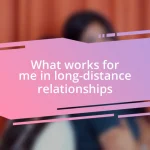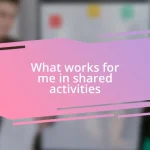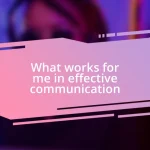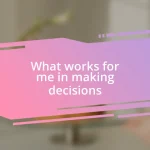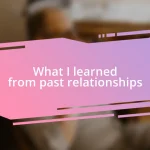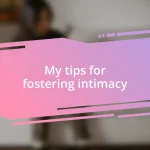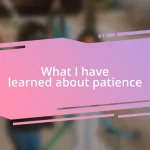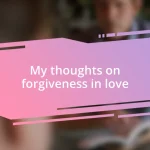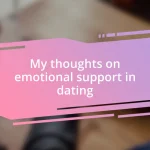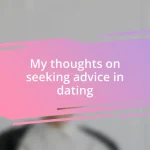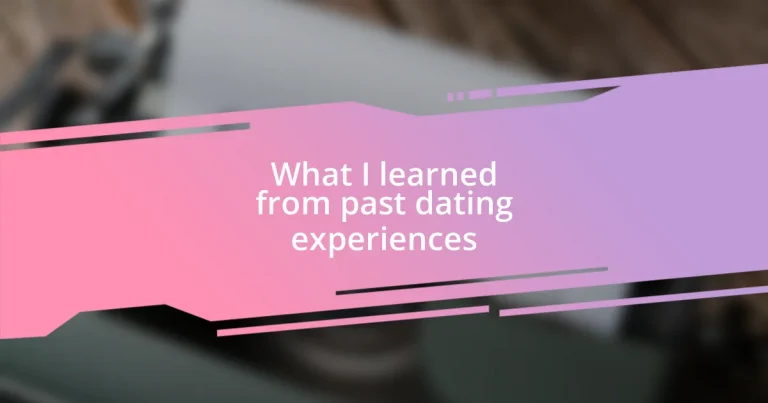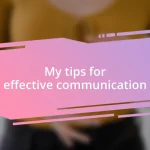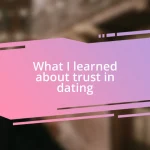Key takeaways:
- Past dating experiences highlight the importance of self-reflection and recognizing patterns in relationships, enabling personal growth and healthier choices.
- Identifying red flags, such as dismissive behavior and inconsistent communication, is crucial for safeguarding emotional well-being in future relationships.
- Building self-awareness and independence fosters confidence and supports open communication, enhancing the quality of current and future connections.
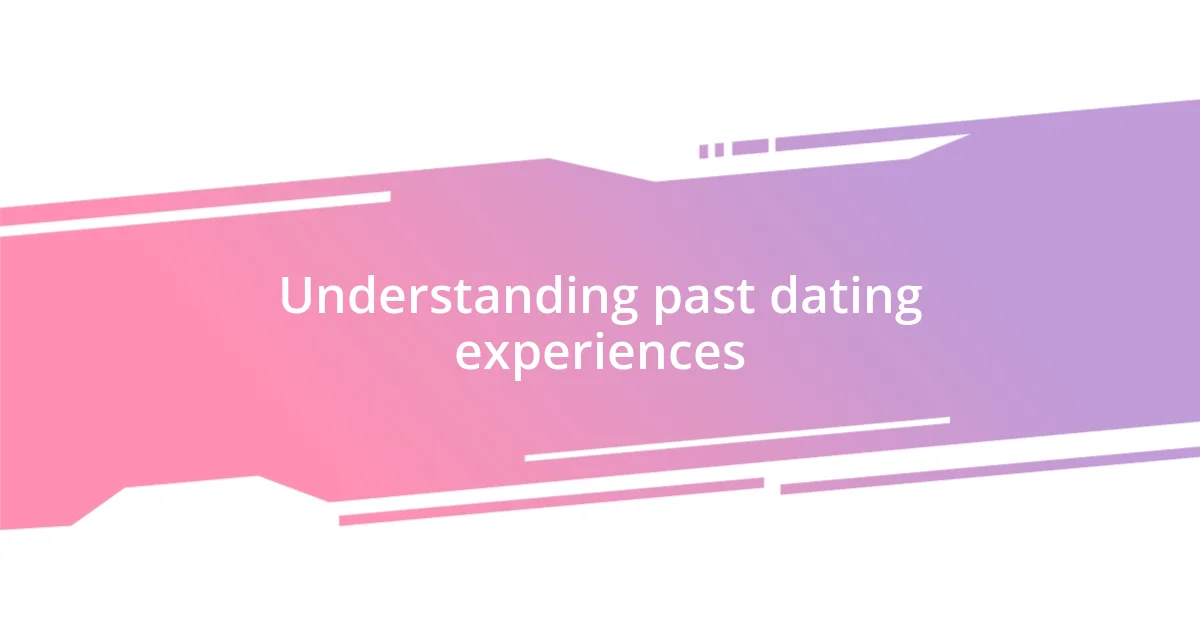
Understanding past dating experiences
Understanding past dating experiences can be like piecing together a puzzle. I recall a relationship that ended with harsh words exchanged and feelings of resentment. Reflecting on it now, I realize those moments were not just about that particular breakup but highlighted deeper issues I had with communication and vulnerability.
Sometimes, I ask myself why I overlooked red flags. In one relationship, I ignored my gut feeling that something wasn’t right, all because I enjoyed the initial excitement. It took a painful and confusing breakup for me to recognize that my intuition had been trying to protect me all along, emphasizing the importance of listening to that inner voice.
Every dating experience offers a lesson, if we’re willing to reflect. I’ve come to appreciate how each encounter contributes to personal growth, even when the lessons feel uncomfortable. After a difficult relationship, I found myself writing in my journal, processing my emotions, and uncovering patterns that shaped my approach to love. This practice not only helped me understand myself better but also guided me toward healthier choices in future relationships.
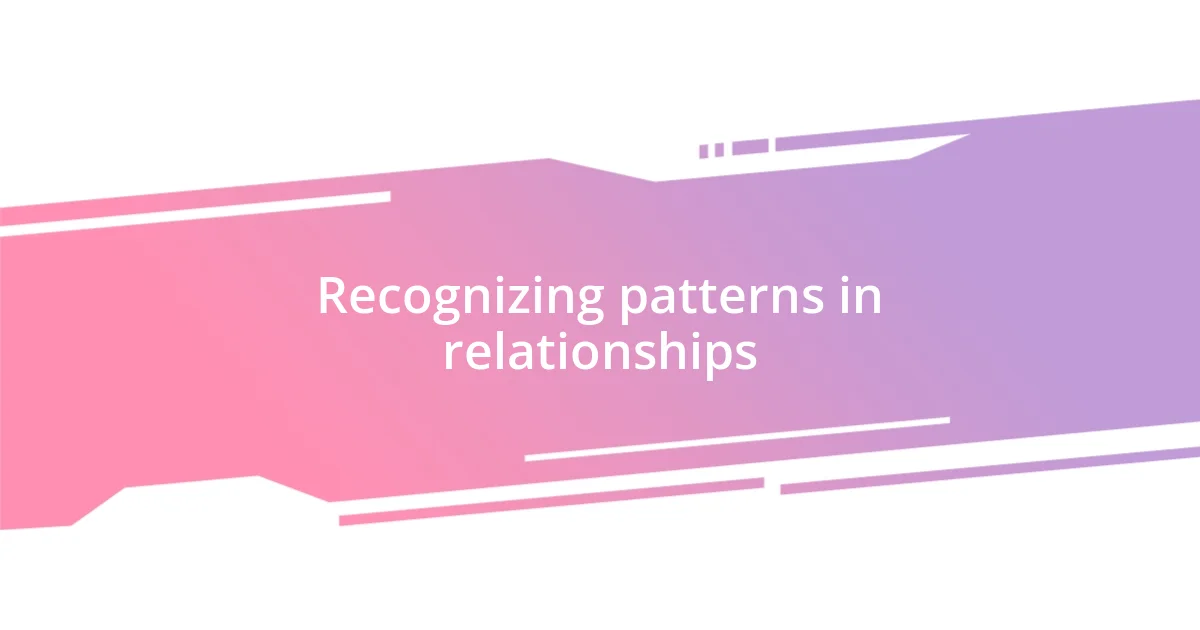
Recognizing patterns in relationships
Recognizing patterns in relationships often requires introspection and a willingness to confront uncomfortable truths. I remember a phase in my dating life where I seemed to attract the same type of partner, each one mirroring the last. It wasn’t until I took a step back that I realized my tendency to gravitate toward individuals who weren’t ready for commitment was closely linked to my own fears of intimacy. Understanding this pattern opened my eyes, allowing me to break the cycle.
Here are some key patterns I learned to watch for:
- Communication styles: Notice if you and your partner have similar ways of expressing feelings; clashes may signal deeper issues.
- Conflict resolution: Recognizing how you both handle disagreements can reveal whether you’re compatible in addressing problems.
- Emotional availability: Pay attention to your partner’s openness; repeated experiences with emotionally distant partners can reflect your fear of vulnerability.
- Patterns of attraction: Consider the traits you find consistently appealing; they may correlate with unresolved issues from your past.
Over time, I soaked in these insights, allowing them to shape my understanding of what I truly wanted. Each shift in perception encouraged me to align more with myself rather than chasing fleeting connections. Through this ongoing self-discovery, I felt empowered to make healthier choices, paving the way for more fulfilling relationships.
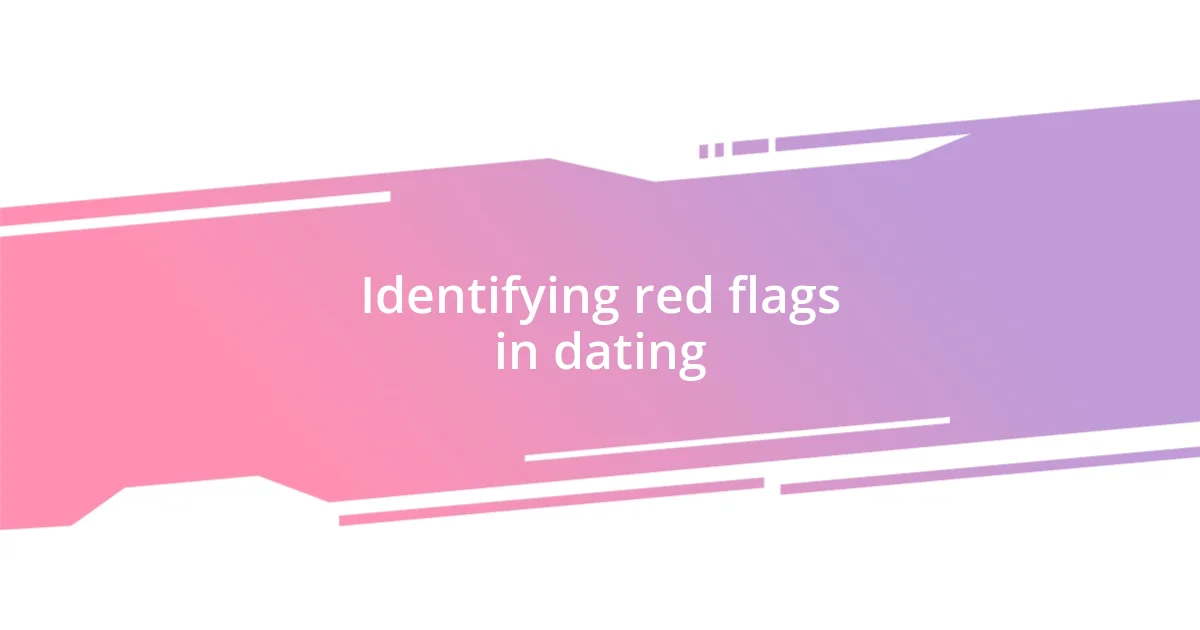
Identifying red flags in dating
Identifying red flags in dating is something I’ve learned to prioritize over time. One situation that stands out is a relationship where my partner frequently made dismissive comments about my interests. At first, I brushed it off as humor. However, with each encounter, I felt increasingly belittled. It dawned on me that any partner who doesn’t respect your passions might not be the right match. Trusting my feelings helped me recognize that this behavior was a significant red flag.
Another experience taught me about inconsistency in communication. I remember dating someone who would often go silent for days, only to return with grand gestures and apologies. While it was easy to get swept up in their charm, I eventually saw the pattern of emotional volatility. This inconsistency was a warning sign pointing to deeper commitment issues. Now, I remind myself that clear and consistent communication is fundamental for a healthy relationship.
I’ve also learned the importance of observing how my partner treats others, especially in stressful situations. Early on, I dated someone who displayed impatience and rudeness to waitstaff. At that moment, I felt uneasy, but I rationalized it away thinking it was a one-time incident. Eventually, I realized that someone’s treatment of others is often a reflection of their character. It’s a red flag that I now take seriously. Recognizing these signs has been crucial in steering me toward more positive and respectful relationships.
| Red Flag | What It Typically Indicates |
|---|---|
| Dismissing Personal Interests | Lack of respect and appreciation for your individuality. |
| Inconsistent Communication | Possible commitment issues or emotional instability. |
| Poor Treatment of Others | Insight into their true character and values. |
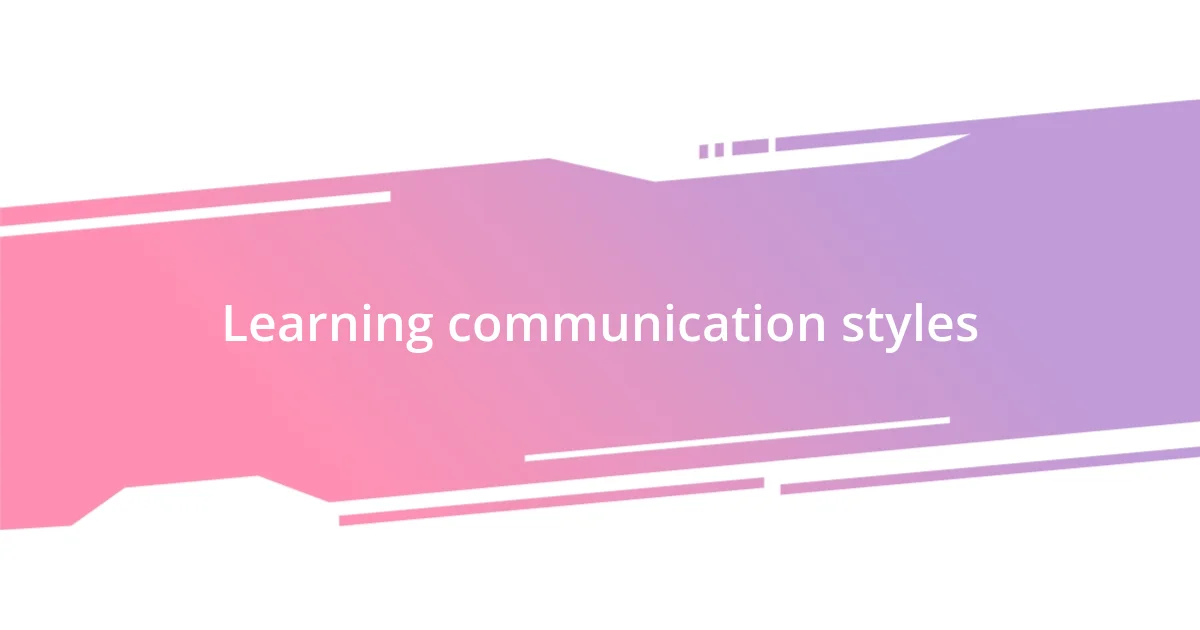
Learning communication styles
Learning different communication styles has been a transformative journey for me. I remember a relationship where my partner would often withdraw during conflicts, leaving me feeling abandoned and frustrated. At first, I thought it was just his personality, but I soon realized that his avoidance stemmed from a fear of confrontation. This taught me that understanding a partner’s communication style is crucial—it’s not just about how we talk but how we navigate tensions.
As I reflected on my experiences, I discovered my own communication habits, too. I often had a tendency to be overly assertive, which could sometimes overshadow my partner’s feelings. During one particular disagreement, I was so focused on expressing my point that I overlooked my partner’s emotional response. It struck me that effective communication isn’t just about being heard; it’s about creating a space where both voices can exist peacefully. How often do we forget to listen because we’re too eager to speak our minds?
This newfound awareness pushed me to actively adapt my style to foster deeper connections. I started asking mindful questions, like, “How do you feel about what I just said?” This simple addition opened up dialogues I previously hadn’t imagined were possible. By learning to adjust my communication and recognizing others’ styles, I’ve noticed a remarkable improvement in how I relate to partners. It’s all about bridging those gaps and building healthier interactions based on mutual understanding.
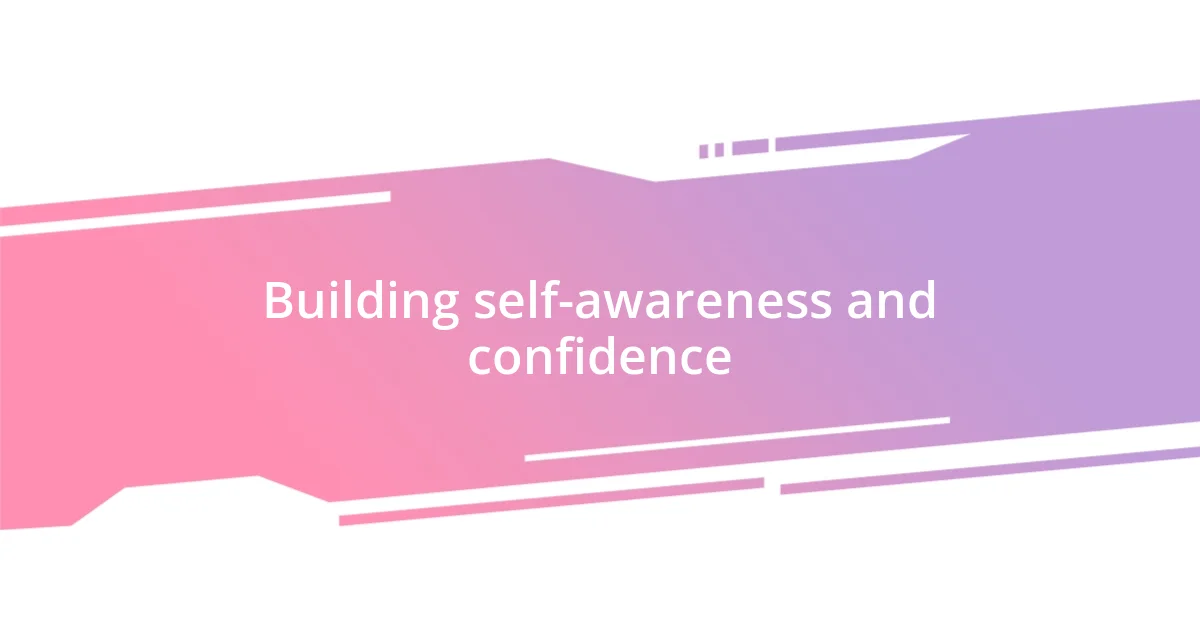
Building self-awareness and confidence
One of the most empowering lessons I’ve gained from past dating experiences is the critical role of self-awareness in building confidence. There was a time when I entered relationships with a shaky sense of self, seeking validation from my partners. I vividly remember standing in front of the mirror, wondering if I would be enough for the person I was dating. This constant self-doubt affected not only my relationships but also my overall happiness. Over time, I learned that true confidence begins within; acknowledging my strengths and accepting my imperfections helped me stand firmly in my own identity.
As I gained this self-awareness, I began to notice how it transformed my interactions. I recall a date where I shared my passions more openly instead of toning them down out of fear. The confidence in speaking my truth not only intrigued my date but also sparked a more genuine connection. It was a revelation for me—when I embraced my authentic self, others were naturally drawn to that energy. I realized that self-awareness isn’t just about understanding oneself; it’s about allowing that understanding to shine in our relationships.
Fostering self-confidence is an ongoing journey, but I find that reflecting on past experiences fuels my growth. How do I feel when I compare myself to others? This question has often led me to uncomfortable answers. Yet, embracing those discomforts taught me to celebrate my unique journey instead. In moments where I felt insecure, I would remind myself of the qualities that make me worthy of love and respect. That internal dialogue, rich with self-acceptance, is what ultimately helps me navigate future relationships with assurance.
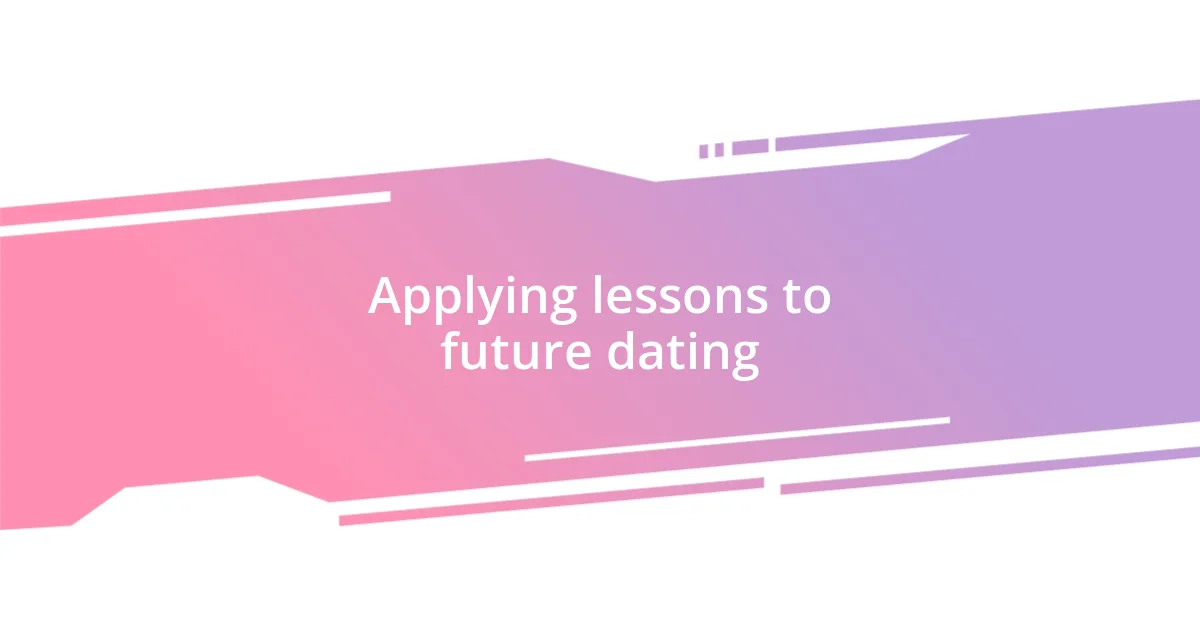
Applying lessons to future dating
Recognizing the lessons learned in past relationships allows us to navigate future ones more wisely. I remember a time when I ignored red flags, thinking I could change the other person. Instead, I found myself trapped in a cycle of disappointment. Now, I approach new connections with a keen eye, asking myself questions like, “What do I truly need in a partner, and what are the signs that align or conflict with those needs?” This clarity helps me set healthier boundaries from the beginning.
It’s fascinating how past dating experiences have shaped my expectations in relationships. There was a period when I would settle for less than I deserved, convinced that love meant compromise at all costs. But after reflecting on those choices, I’ve learned that love should enhance my happiness, not diminish it. Whenever I feel tempted to overlook discrepancies in a budding relationship, I remind myself of the joy I’ve experienced when I hold firm to my standards. Isn’t it liberating to think that upholding one’s values paves the way for deeper connections?
Moreover, I’ve discovered that integrating humor into my dating life can create a more relaxed atmosphere. I once went on a date where our mutual awkwardness turned into laughter over a shared embarrassing story. That moment taught me that it’s okay to be vulnerable while getting to know someone. Now, I aim to approach future dates with a light spirit, asking myself, “How can I invite joy and authenticity into this interaction?” Each encounter is a new opportunity to connect, and I want to make the most of it. Engaging in humor makes the dating experience enjoyable, allowing for genuine bonds to flourish.
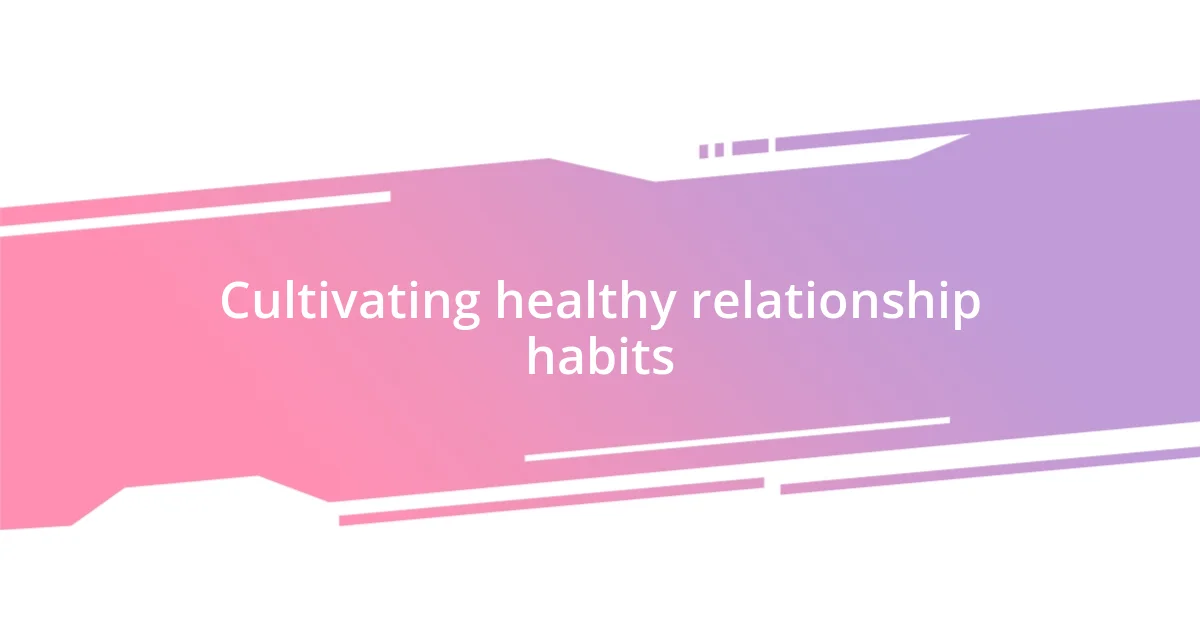
Cultivating healthy relationship habits
Cultivating healthy relationship habits starts with open communication. I recall a particular moment where I hesitated to voice my feelings, thinking it might spark conflict. However, that silence led to misunderstanding and distance. I learned that sharing my thoughts openly allows for clarity and connection. Isn’t it surprising how a simple conversation can clear the air? Now, I remind myself that it’s perfectly okay to address difficult topics. Embracing vulnerability has truly transformed my relationships.
Another essential habit I’ve adopted is practicing gratitude. After a date, I used to dwell on what went wrong, but I realized focusing on the positives shifted my perspective. I remember one delightful evening where my date and I spent hours talking about our favorite books. Instead of nitpicking small details later, I found joy in that memory. How often do we take the time to reflect on what we appreciate in our partners? By actively expressing gratitude, I’ve noticed that it enhances the connection and fosters a supportive environment.
Lastly, maintaining a sense of independence is crucial for a healthy relationship. Early in my dating life, I often found my identity intertwined with my partner, which left me feeling lost when things didn’t work out. I vividly remember a period of self-exploration, where I invested time in hobbies and friendships. This shift taught me that my happiness doesn’t solely rely on someone else—it’s derived from within. Isn’t it empowering to realize that we can be whole just as we are? Building this independence not only enriches my life but also brings a stronger, more resilient energy into my relationships.
